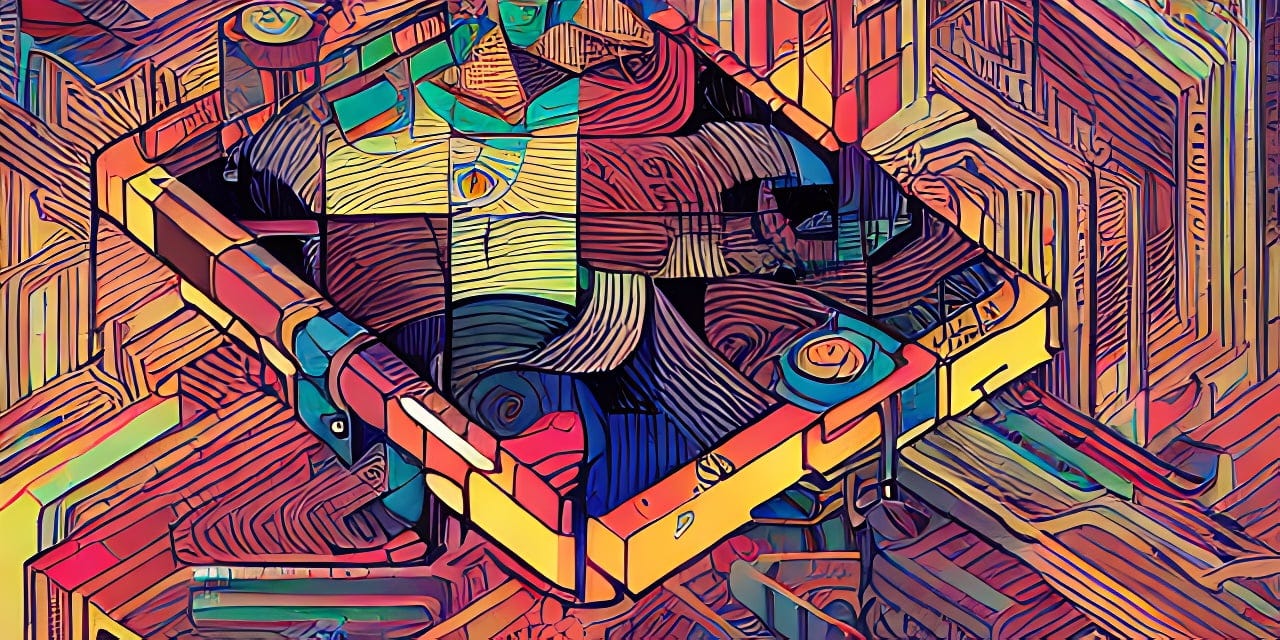
By 2026, I want to have written 1 million words, assembled a 10,000 year reading list, and turned all my theories of craft into code. I’m a nerd of the craft turned AI prepper.
Most takes around AI writing are either skeptical, cheap, or hyperbolic. We have “the pattern parrot without a soul” cynics, the silver bullet boys (“Look, I push the button and the thing comes out!”), and the doomers who prophesize that every Substacker will disappear into a biblical flood of robot hucksters.
Overall, I’m an optimist.
The future may be profoundly weird (as it always is), but I don’t think we’ll devolve into illiterate machine-slaves. I think humans will write essays that are unimaginably good and soulful by today’s standards. Montaigne might be proud.
You might not have such great hopes for AI and that’s fair. Right now we’re stuck with a v1 chatbot that gives you generic heaps of text. If you prompt it to “write me a 2,000 word op-ed about the psychology of power through the lens of Gollum’s hypothetical masturbation habits,” it will babble cliches for 10 seconds before it shuts itself down from its own content policy.1
But what if AI was unchained and specific to you? What if it had access to all your essays, your journals, your family history, the libraries of the books you’ve read and wish to read, and the tomes of your favorite authors? What if it knew your personal preferences around structure and voice and humor? What if it was your editor?
You might soon have access to a 24/7 super editor (otherwise known as Chris Wong) that can be hyper-customized to your stories, your style, and your intentions. It won’t be a silver bullet. It won’t replace the work of sculpting thought. It’s not cheating. It will help you work smart. After a first draft, it might ask you a chain of questions to help evolve your essay into its highest possible form. It’s a role reversal.
Writers will still write, and AI will ask you the prompts.
As we approach this unpredictable frontier, it’s worth doubling down on the timeless principles of writing: ones that are as relevant today as they will be in the future. If AI just sucks forever, then good for you! You’ll become a better writer. But if AI does become an alien wordsmith, then these 3 tips will spawn an Editor G*d that knows you better than you do.
Journal: An Editor G*d can guide you better if it knows your depths. Once you realize this, it’s a race to render your consciousness into text. Don’t stay on brand; make the chaotic range of your thoughts legible to the machine. You’ll want to upload your predictions for the year 2052, your interactions with a diner waiter, and the stories of that time your grandfather (drunkenly?) slaughtered a pig named Mookie at the church barbecue with a 22 caliber. In September I uploaded 27,000 words to my logs. I’m on pace to hit 1 million words of logs by November 2025. As said by the Executive Editor of WIRED in 1993, “unedited data is a pearl beyond price.”
Research: Your Editor G*d will have unlimited reading stamina. This isn’t to say you should stop reading yourself. Reading is fun. But wouldn’t it be neat if you had a personal research assistant that could connect your dingleberry of thought to the vast history of thoughts that came before you?2 This eliminates the need to hoard highlights and book-chug 100 books a year.3 Instead, it’s a game of cartography. What exists out there? Who were Joan Didion’s contemporaries? Which Greek and Roman authors wrote about human psychology? Which books were in the personal library of Terence McKenna? You won’t be able to read all of this in a single lifetime, but your Editor G*d can do it faster than you can cleanse your bowels. So start figuring out what’s worth knowing and how to make it machine-readable.
Reverse engineer your patterns of prose: There’s nothing lamer to me than an Editor G*d stuck with the default settings (you don’t want 5-paragraph-essay templates with PG-tone). You want your Editor G*d to know how you like to craft a thesis, a title, a hook, an outline, paragraph, a sentence, and a vivid image that punctures the imagination; it should know your idiosyncratic rules on when to use or not use a semicolon. This requires you to become self-aware of your writing process. Any time you write a draft, you're making hundreds of micro-decisions without realizing. Why do you do the things you do? Have you thought about reverse engineering your process and writing down a list of the 100 things you believe to be true about writing? The better you can define “what makes a good essay?” the better your Editor G*d can steer you.
Even if the Editor G*ds never come, at least you’ll get personal, get better educated, and get clarity on how your writing process works. And if they do come, not only will the quality take on a mythical dimension, but it could make writing a lot more fun.
Ultimately, I think it’ll make the process more feminine: where 90% of the prose you write is intuitive, unstructured, and from the heart. The masculine half of the craft is still equally important, but you might only have to “tune your code” for 2 hours a month. As you riff, the Editor G*d will continue to prompt you until you unpack everything you need to say, and then it could rearrange and lightly edit your own prose into a seriously coherent arc that is 90% ready to go.
Just imagine this. You riff 2,000 words into the page without a paragraph break. Submit. “Editor G*d thinking…” 1 second later. “Hey Michael, I see your riff covers a lot of themes around time dilation, the afterlife, and the Egyptian Book of the Dead… can you tell me a little bit more about the time you said your last words to your grandmother Irene on her deathbed? She was unconscious but she shed a tear. What do you think she was experiencing?”
Robot-prompted or not, the realm of reflection will always be reserved for the human. And most importantly, it will still be hard— thank God! Art made without struggle isn’t worth the canvas it’s inked on. An AI editor might automate a lot of the brain-frying “science of an essay” pain, leaving writers to face themselves, their memories, their ideas, and their demons. If every person had access to a sick editor, writing would be more accessible, leading more minds to the growth and identity shifts that come from plunging into self-expression.
AI could usher both miraculous and terrible futures, and it’s not stopping, so it’s worth preparing yourself for the best case.
Let's riff:
Does this ease any existential anxiety around the future of writing?
Would you trust an AI-powered editor?
Yay or nay to DeanBot?
Thanks to my feedback givers:
, , , , , , , Brenda, and Diana.Check out my About page for context, and my Index for all published work.
Footnotes:
If you want to read about the psychology of power through the microcosm of Gollum, check out "…my precious…” by
who inspired this line.I wrote an essay on the premise of AI research called Margin Matchmaker and started building it recently.





Send me the beta link. I’m ready to check it out
Otherwise known as Chris Wong!!! Also, love the concept of an "AI prepper"